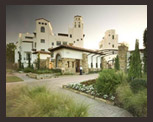
CAMP LOGAN
 Camp Logan/Rice Military neighborhood, next to Memorial Park, played an important role in Houston’s history. Created in 1917-1918 as a training facility for the United States Army, Camp John A. Logan, named for the founder of Memorial Day, was constructed on 1,400 acres three and one-half miles west of downtown and prepared more than 30,000 soldiers for service on the Western Front in World War I. The army’s famous Fifth Division was organized and headquartered at Camp Logan. Their nickname was the “Red Devils”, given to them by the Germans during the campaign of St. Mihiel.
Camp Logan/Rice Military neighborhood, next to Memorial Park, played an important role in Houston’s history. Created in 1917-1918 as a training facility for the United States Army, Camp John A. Logan, named for the founder of Memorial Day, was constructed on 1,400 acres three and one-half miles west of downtown and prepared more than 30,000 soldiers for service on the Western Front in World War I. The army’s famous Fifth Division was organized and headquartered at Camp Logan. Their nickname was the “Red Devils”, given to them by the Germans during the campaign of St. Mihiel.
In a sad chapter of the area’s history, black troops from Illinois, assigned to guard ongoing camp construction, mutinied in August, 1917. The causes were cumulative and related to the treatment the veteran soldiers received in a segregated Houston. Resentment smoldered and erupted in violence. The black soldiers marched east on downtown Houston firing their weapons. More than 30 people, black and white, were killed.
By 1918, Camp Logan was serving as a military hospital and Houston’s first golf course was built on the grounds for the convalescing soldiers. The camp was decommissioned and closed in March, 1919.
In 1923, Mike and Will Hogg, sons of a former governor of Texas, purchased 875 acres of the former military camp, plus additional adjoining acreage from the family of William Marsh Rice, to develop home sites. Choosing instead to develop south of Buffalo Bayou (River Oaks), the Hoggs sold the property at cost to the city of Houston as part of a 1,505-acre park dedicated to the soldiers of World War I.
Today, Camp Logan/Rice Military is a residential neighborhood of older and recently constructed homes and townhomes enhanced by proximity to Memorial Park, one of the nation’s largest public parks, and its location inside Loop-610. A landmark of the neighborhood is an oak tree that predates the Republic of Texas. Camp Logan/Rice Military is only minutes from downtown, the Museum District, and Houston’s best shopping.
![]() Search: CAMP LOGAN
Search: CAMP LOGAN
![]() Visit Website: www.camplogan.org
Visit Website: www.camplogan.org








